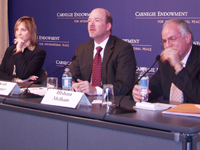Registration
You will receive an email confirming your registration.
Observers in the Middle East will scrutinize President-elect Barack Obama's early speeches for hints on the new administration's policy in the region. Given the complexity of conflicts in the region, President-elect Obama should be clear and modest in his approach but should nonetheless articulate principles that will underlie the U.S. approach. It may be better to take concrete steps to show his commitment to handling the region’s burning issues in advance of major policy statements.
To consider what President-elect Obama should say to the Middle East, the Project on Middle East Democracy (POMED), in conjunction with the Carnegie Endowment for International Peace, hosted a discussion on the topic based on POMED’s recent publication, “Speaking Clearly: What Should President Obama Say to the Middle East?”
Speakers included Hisham Melhem, Washington bureau chief for Al-Arabiya; Scott Carpenter, Keston family fellow at the Washington Institute for Near East Policy; Michele Dunne, senior associate at the Carnegie Endowment and editor of Carnegie's Arab Reform Bulletin; and Heather Hurlburt, executive director of the National Security Network. Andrew Albertson, executive director of Project on Middle East Democracy, moderated the discussion.
A Fragmented Middle East:
Hisham Melhem said President-elect Obama will inherit a politically and socially fragmented Middle East, one that is suffering from a dearth of leadership and is resistant to U.S. influence. The new administration’s approach to the region should not be Israel-centric, and a fundamental shift in paradigm is required. The new administration should not abandon the promotion of democracy, but it should press Arab states to take responsibility for the state of affairs in their counties.
Clarity, Honesty, and Modesty:
Scott Carpenter argued the United States must be clear about its interests in the region. He also warned against calls for a radical change in policy, and the implications such rhetoric have for the U.S. relationship with Israel. An honest tone and a modest approach are vital for the creation of policy in the region.
Michele Dunne explained that President-elect Obama needs to build relationships with the peoples of region as well as their governments. This involves connecting to people’s aspirations for peace, justice, development, and democracy. Obama can simply show that he is aware of the region’s concerns and aspirations, and of the connections among issues in the region. The new administration should avoid the mistakes of its predecessors who arranged the Middle East’s issues in a strict sequence and expected one goal—whether the Arab-Israeli peace process or democratization—to lead to resolution of all the region’s ills.
Heather Hurlburt stressed the importance of waiting before giving a speech on the new administration’s policy and promises to the Middle East, and using the time instead to take concrete steps in the region on issues such as withdrawal from Iraq and closing Guantanamo Bay. Above all, the new administration has to send an explicit message of cultural understanding, not only to the Middle East but also to Americans about the Middle East and Muslim world.
Questions and Answers:
In the questions and answers session the speakers further addressed the need for President-elect Obama to send a message of action and modesty, take opening steps in approaching Iran before making a speech on Iranian policy, and increase the use of public diplomacy in the region.
